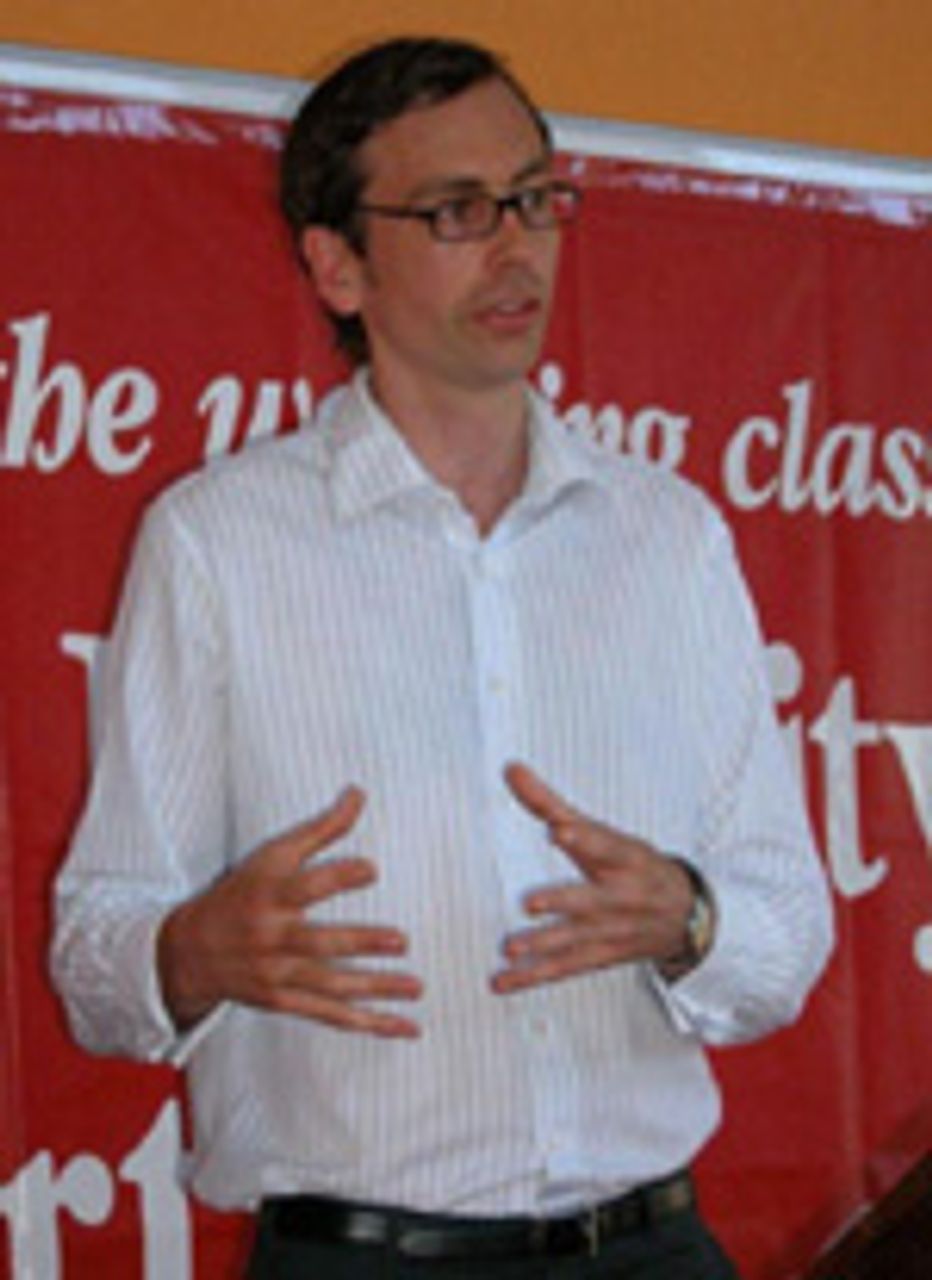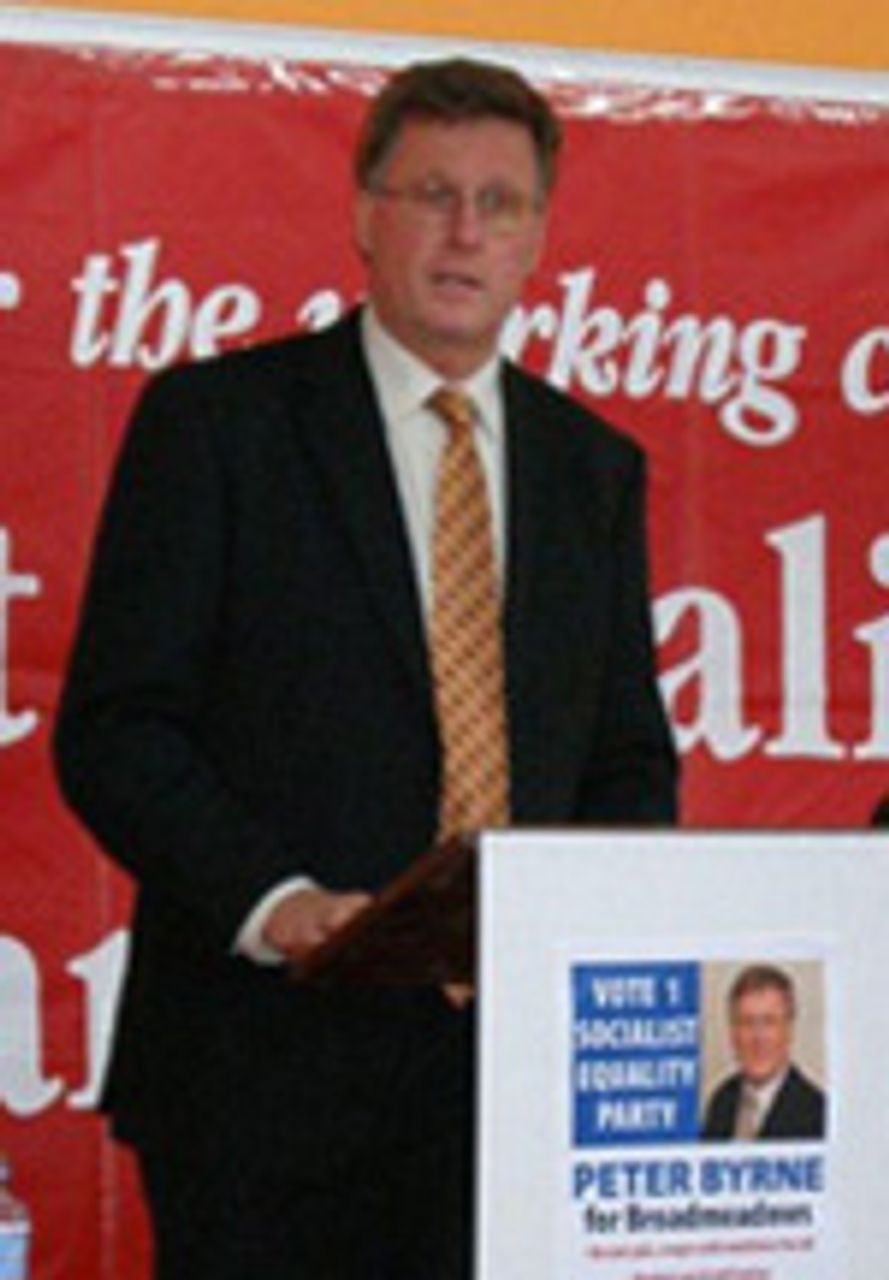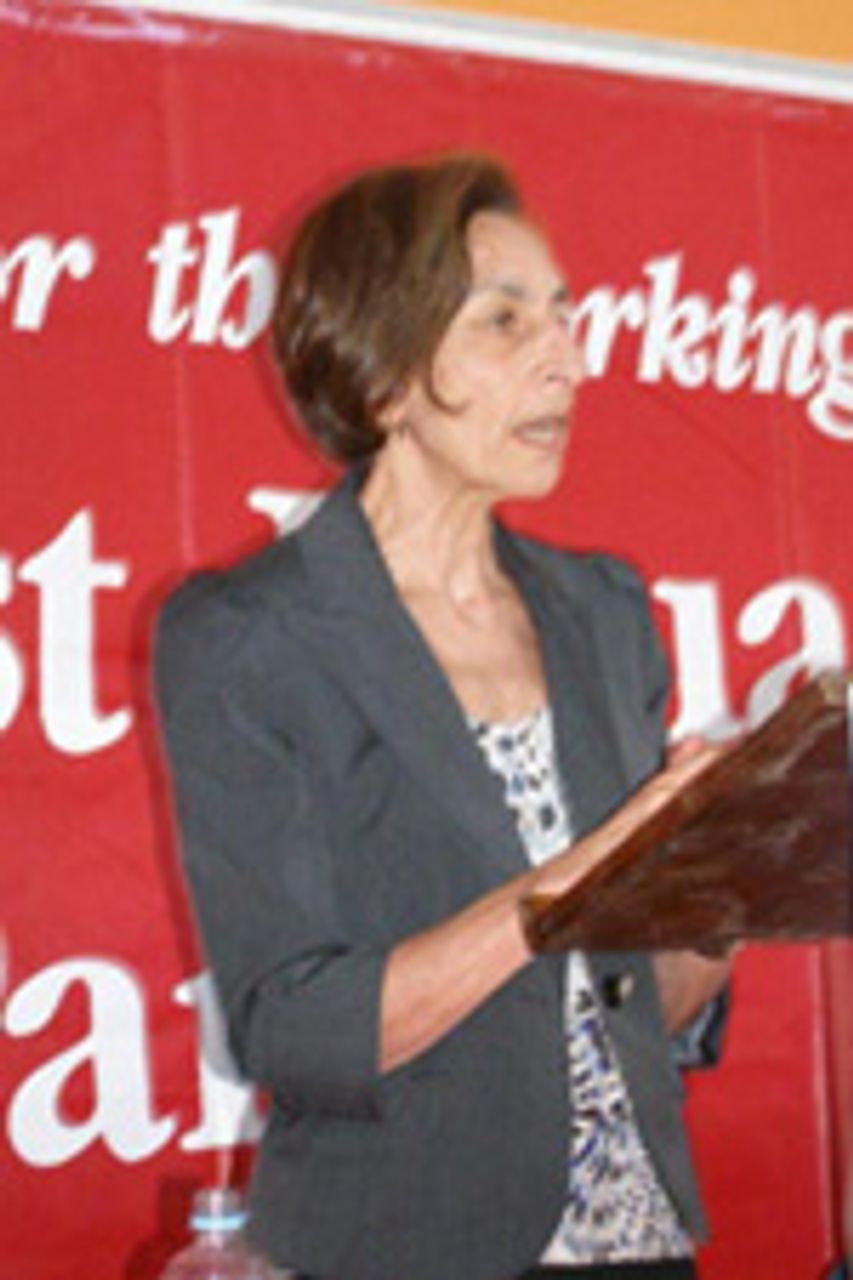Socialist Equality Party speakers drew out the historic significance of the Egyptian revolution at the party’s final public meeting in the Broadmeadows by-election campaign in Victoria yesterday, ahead of the vote on February 19. The event was attended by an important layer of workers, students, and young unemployed people, several of whom had learned of the meeting through SEP campaigns at shopping centres, social security offices, and other public places in the working class electorate.
 Patrick O'Connor
Patrick O'ConnorThe main speaker, World Socialist Web Site correspondent Patrick O’Connor, told the meeting: “What is unfolding in the Middle East can only be understood as the opening of a new revolutionary epoch.”
“The protracted period of political reaction that came in the wake of the defeats suffered by the working class during the last period of revolutionary upheavals internationally—from 1968 to 1975—is coming to an end,” O’Connor said.
“Processes that have developed over the past thirty years—the globalisation of production, the staggering growth of social inequality, the transformation of the old parties and unions that once claimed to represent the working class into the open agencies of capitalist exploitation, the tremendous alienation of masses of workers and young people from the entire official political set-up, the intractable decline of US capitalism and the breakdown of the world capitalist economy that began with the 2008 financial crash—all these processes have combined to bring about a qualitative transformation in world politics. The Egyptian revolution has arisen out of global processes which find their expression in every country, including Australia. That is why the Egyptian Revolution is the harbinger, the beginning, of the world revolution.”
O’Connor provided a concise outline of the day-by-day development of the revolution, beginning with the initial demonstrations in Cairo on January 25.
By February 6, “Day 13”, following the opening of negotiations between Vice President Omar Suleiman and opposition parties, including the Muslim Brotherhood and a member of Mohamed ElBaradei’s National Alliance for Change, there was widespread discussion in the international media that the anti-regime movement was losing momentum; that “normal” life was resuming in Cairo. Then, however, a nation-wide strike movement erupted on February 8 and 9, involving wide layers of the Egyptian working class—public sector employees, including in the state health ministry, state electricity workers and public transportation workers, textile and other manufacturing workers, and Suez canal employees.
“The decisive intervention of the working class completely changed the situation, having raised the spectre of social revolution,” O’Connor said.
The military hierarchy intervened, forcing Mubarak to step down and taking power in its own hands. The SEP speaker warned against illusions in the role of the army that were being promoted by the various bourgeois tendencies in Egypt, recalling the experience in Chile, where the Stalinists hailed the military as a progressive and democratic force, the “people in uniform”, right up until the day of the bloody and catastrophic 1973 coup.
“The revolutionary period that has opened up will be protracted,” O’Connor concluded. “It is early days. The International Committee of the Fourth International and the Socialist Equality Parties around the world see our task as the construction of a genuine revolutionary leadership and mass revolutionary party of the international working class. We are confident that in Egypt, across North Africa and the Middle East, in Israel, in Iran, and internationally, the perspective of permanent revolution, of Trotskyism, will cut a path to the most dedicated and self-sacrificing layers of the working class and youth. Our preparation for the eruption of revolutionary struggles, both internationally and above all in this country, consists in the education and training of a new revolutionary leadership. That is why we urge you to join our party, the ICFI, the world party of socialist revolution today.”
 Peter Byrne
Peter ByrnePeter Byrne, the SEP’s candidate for Broadmeadows, explained that the SEP was the only party discussing with workers and young people the significance of the events in Egypt. “In fact,” he said, “we are the only party raising anything of substance in this election campaign. No other candidate is discussing any of the pressing political, economic and social issues confronting working people. There are no public meetings being held by anyone except the SEP, no debates and no forums. The entire by-election process is thoroughly anti-democratic—the political and media establishment has already decided that the Labor Party candidate will be installed. One senses that the state Liberal government would be happy to scrap the whole process and simply allow Labor to appoint its replacement candidate.”
Byrne described the economic and social crisis in Broadmeadows, an area with an official unemployment rate of 15.9 percent and a youth jobless rate of 53 percent. “This staggering figure demonstrates that young people here confront similar problems as young people in Egypt, Tunisia and elsewhere—no jobs and no future under the profit system.”
The speaker noted that the Labor Party had issued its voting “preferences”, that is, the order in which it wanted its supporters to rank the nine candidates on the ballot paper. (Under Australia’s compulsory preferential voting system, a vote is invalid unless every candidate is ranked in order of preference.)
“We are proud that the Labor Party has placed the SEP last, number nine on its preference list, behind the Greens, the Sex Party, the anti-communist Democratic Labor Party and an array of right wing independents” Byrne said. “This is an expression of its hostility and contempt towards the working class, because only the SEP represents that class and its historical interests”.
 Jean Shaoul
Jean ShaoulJean Shaoul, a national committee member of the Socialist Equality Party in Britain, spoke on the international significance of the unprecedented public spending cuts being implemented in Britain and Europe.
“The Conservative-Liberal government will cut £83 billion ($A132 billion) from public expenditure by 2015, an amount equal to 20 percent of departmental expenditure, so as to cut the budget deficit from 11 percent to 2.1 percent of gross domestic product by 2014-15,” she explained. “Britain is not alone. Every European government, whatever its political complexion, is imposing similar austerity measures, as each takes protectionist measures to compete with its low wage rivals.”
Shaoul referred to the statement “Oppose all cuts in public spending: Build rank-and-file committees to lead the struggle” issued by the SEP in Britain last week.
“To oppose the government’s measures, workers need a new perspective and programme, and new methods of struggle,” the speaker elaborated.
“The SEP calls for the building of a politically independent, mass social movement, based on a socialist programme, uniting working people in Britain with workers in Europe and internationally. It is no accident that we have issued this statement at this time. As the events in Tunisia, Egypt and the Middle East have shown, workers are beginning to enter politics again as a mass force, to say that they have had enough, that they can’t go on in the old way and they want change. Today it is the workers in the developing countries. Tomorrow it will be the workers in the advanced countries. But how is change to achieved?”
Shaoul outlined the desperate efforts of the various pseudo-socialist organisations in Britain, including the Socialist Workers Party, to bolster the waning political authority of the Labour Party, trade unions, and student union leadership.
“Unlike the Socialist Workers Party and the other fake lefts, we call for working people to break from the Labour Party and trade unions, and to build new democratic organisations of working class struggle, as the basis for opposing the coalition government,” she said. “We call for rank-and-file committees in the workplace, and committees of action, to unite all sections of the working class—the employed and unemployed, students, those in unions and those not in unions. The purpose of such organisations is to unite all the struggles to defend jobs, wages, public services, deportations, evictions, and so on, in a political and industrial offensive to bring down the government. A workers’ government pledged to socialist policies is the only way that workers can oppose big business and its control over society.”
A lively discussion followed the three reports. Questions were raised about the various ways in which the SEP could inform working people about its program, the role of religion in Egyptian politics and society, the state of political consciousness among Egyptian workers, and what the response of the working class there had been to the military’s assumption of power.
One young member of the Australian army asked how long it would take for the SEP, when it came to power, to resolve the various social problems in areas like Broadmeadows. The speakers explained that it was not a question of the SEP taking power and resolving the problems confronting working people on their behalf. Rather the party was the decisive vehicle through which the working class could become politically conscious and develop its own independent perspective, seizing political power in order to establish a democratically planned socialist economy, in which ordinary people themselves could determine the decisions affecting their lives and communities. The SEP was not advancing a parliamentary reformist perspective. The speakers raised that a workers’ government must be established, based on new and independent organisations including workers’ councils and workplace committees, through a revolutionary struggle against the profit system and the capitalist state. They stressed that this required an internationalist perspective; a socialist society could only be established as part of the world revolution.
World Socialist Web Site reporters spoke with some of those in attendance.
 Cindy
CindyCindy, a Year 12 high school student, said: “I think that what is happening in Egypt is a real wake up call to all workers. I didn’t know about the Mubarak dictatorship before but the reports really opened up my eyes. Everything is starting to change but then having the military in charge is a big problem because they still symbolise the old regime of the Mubarak dictatorship. I think that what happened in the Russian Revolution is relevant today because in the February revolution when the Provisional government came in—it reminds me of what is happening now in Egypt.
“I was reading the World Socialist Web Site and I found out that the ALP candidate for Broadmeadows is [property developer] Frank McGuire. He is the brother of [media celebrity] Eddie McGuire, I think that this shows that the millionaires in Australia greatly influence government policies. I don’t think it is democratic that a rich man is representing people in Broadmeadows. The problem is that not enough people know about the Socialist Equality Party. My mum votes for the Labor Party because she thinks that ‘Labor’ means they are for workers, but they’re not.
“My aunty was involved in the Swift [meatworkers] strike. She was not directly involved in going on strike but she was among those who had to keep working while the others were locked out. They were getting $16 an hour—that is not enough when you are working under really bad conditions like at Swift. I heard that all the workers got from the union when they were on strike during the Christmas period was $200—I was shocked, that is not enough. Also, my friends are working for $7 an hour at McDonalds and I know of people on disability pensions packing Easter eggs for $1 an hour. That is like slave labour.”
The soldier said: “I thought the meeting was interesting to say the least. I felt my question was answered very well—it is good to hear how the party actually works and what its beliefs are.”
He spoke about the unemployment crisis in Broadmeadows: “I looked on the [government’s] Job Seekers website the other day out of interest. The majority of the jobs were in quite rich areas—there were many more available in the wealthier suburbs than in Broadmeadows. I’m talking about just basic jobs, in a kitchen or a bar for example, that you don’t need special qualifications to do. I’m actually looking for work myself—there is nothing in Meadow Heights, nothing in Broadmeadows. Almost the only thing available here is working in McDonalds or Subway. There are no apprenticeships offered here at all.”
On the war in Afghanistan, he explained: “I’m still in the army, as it takes a while to get a discharge. I’m still a few months away from being discharged. I was a corporal and I had nine men under me—like me, some of them didn’t agree with the situation in Afghanistan. I didn’t think we should be there. It was pointed out by one of the speakers why the United States was there in the first place—for its own interests, they thought they would reap all the benefits.
“The first time I was in Afghanistan was for eight months and the second time for six months. I disagreed with being there from the start, but I went because it was my job. The Australian military come in and play ‘hearts and minds’ to the population, so we can look like the good guys, rather than be like the Americans and destroy everything. But the reason for Australia going there is the same as the US being there. As well as disagreeing with the war, I have left the army because I want to be closer to my family. I didn’t want to risk my life because I have a two-year-old daughter and I don’t want her to be an orphan.”
Russell, an unemployed worker, spoke about some of his own experiences: “Everything from Centrelink [the government’s social security provider] is privatised. From Centrelink we are contracted to private job agencies by the government. The agencies are supposed to get you a job but they don’t. I’ve been to many agencies over the years, but they never get me anything. They put you into a course or apprenticeship because they know there really are no jobs. These things are just not viable for someone my age. An apprenticeship in hairdressing or a course in retail is fine if you’re out of high school, but for someone my age it’s not sustainable.”
Authorised by Nick Beams, 113/55 Flemington Rd, North Melbourne 3051.
